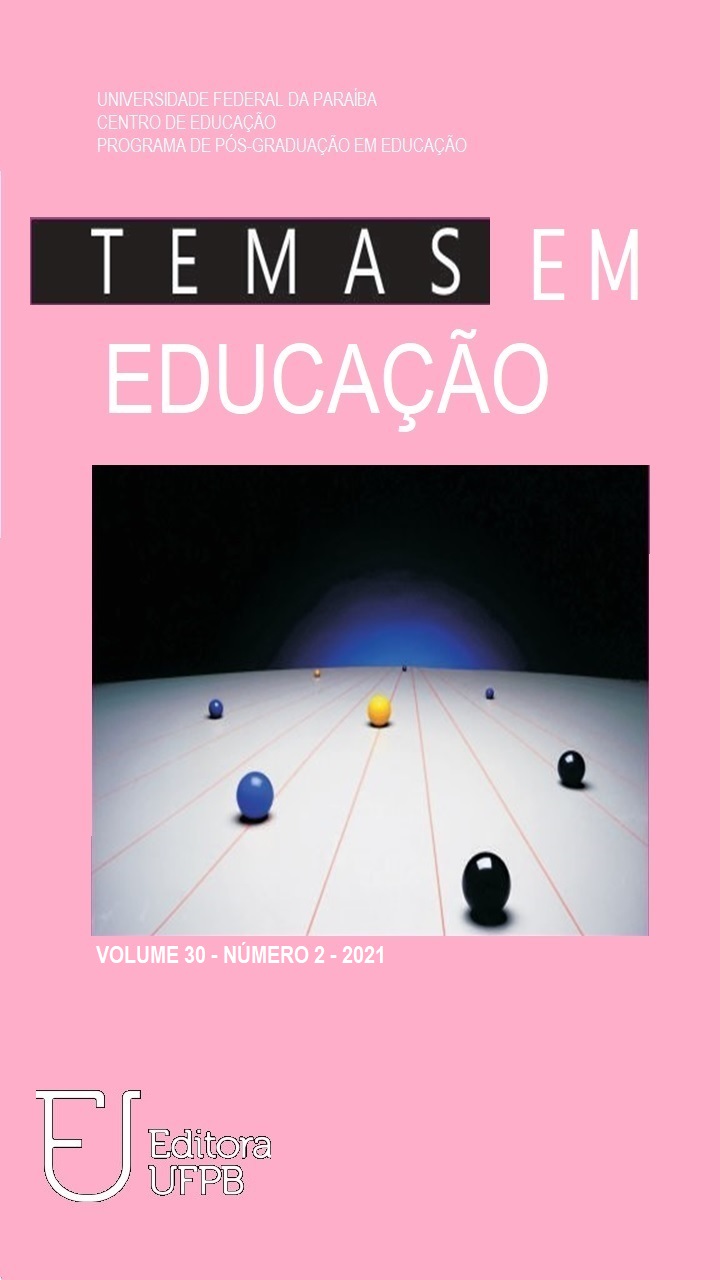GAMES, FORMATIVE DIMENSION AND LEARNING IN SOCIOLOGY
DOI:
https://doi.org/10.22478/ufpb.2359-7003.2021v30n2.53453Keywords:
Palavras-chave: Jogos. Processo de ensino-aprendizagem. Sociologia.Abstract
The article addresses the topic of games, culture and education. The proposal is to investigate, in detail, the relationships between games, formative dimension and learning in sociology. Based on the theoretical assumption that gives the game a cultural character whose characteristics are linked to social aspects, the work draws on the experiences of students from the 1st year of high school at Escola de Aplicação / UFPA, involved in the project When to play is to learn, as the object of study of the present work. Starting from the premise that the game is a means to achieve specific learning and contribute to human development, the article aims to analyze the specificity of the learning potential that games provide in the teaching of sociology. To this end, it raises the following research problem: what are the training possibilities of games in understanding sociological content? The hypothesis reiterates that games provide opportunities for experiences and learning that mobilize content and concepts in a playful and relaxed way. The construction methodology of this article is of a quanti-qualitative nature. The focus of the empirical investigation was based on the analysis of the students' perceptions obtained through responses to questionnaires. The results of this study demonstrated that the games create a favorable environment for the development and learning of sociology, as it motivates students to overcome cognitive and emotional obstacles, arouses interest, stimulates reflection, discovery, assimilation and enables better integration in social relations.
Keywords: Games, teaching-learning process, sociology.
Downloads
References
AVANCO, Leonardo Dias; LIMA, José Milton de. Diversidade de discursos sobre jogo e educação: delineamento de um quadro contemporâneo de tendências. Educação e Pesquisa, São Paulo, v. 46, 2020.
BROUGÈRE, Gilles. A criança e a cultura lúdica. Revista da Faculdade de Educação, São Paulo, v. 24, n. 2, jul./dez. 1998.
CAILLOIS, Roger. Os jogos e os homens: a máscara e a vertigem. Petrópolis, RJ: Vozes, 2017.
CANDAU, Vera Maria et al. Oficinas pedagógicas de direitos humanos. 2. ed. Petrópolis, RJ: Vozes, 1995.
CHATEAU, Jean. O jogo e a criança. São Paulo: Summus Editorial, 1987.
CHAUI, Marilena. Convite à filosofia, São Paulo Ática, 2012.
CIGALES, Marcelo Pinheiro. O Ensino da Sociologia no Brasil: Perspectiva de análise a partir da História das Disciplinas Escolares. Revista Café com Sociologia, v. 3, n. 1. jan. de 2014.
CONDESSA, I. C. (Re) aprender a brincar. Ponta delgada: Nova gráfica, 2009.
CREPALDI, Roselene. Jogos, brinquedos e brincadeiras. Curitiba: IESDE Brasil S.A, 2010.
DIETRICH, Pascale; LOISON, Marie; ROUPNEL, Manuella. Articular as abordagens quantitativa e qualitativa. A pesquisa sociológica. Petrópolis, Rio de Janeiro: Vozes, 2015.
FIALHO, N, N. Os jogos pedagógicos como ferramenta de ensino. 2008. Disponível em: www.moodle.ufba.br/file.php/8823/moddata/.../jogos_didaticos.pdf. Acesso em: 05 fev. 2019.
GIACOMINI, M.P.; PEREIRA, N.M. (Org.). Jogos e ensino de História. Porto Alegre: Evangraf, 2013.
GRUBEL, Joceline M.; BEZ, Marta R. Jogos Educativos. RENOTE. Revista Novas Tecnologias na Educação, v. 4, p. 1-7, 2006.
HUIZINGA, J. Homo ludens: o jogo como elemento de cultura. São Paulo: Perspectiva, 2000.
KISHIMOTO, Tizuko Morchida (Org.). Jogo, brinquedo, brincadeira e a educação. 2. ed. São Paulo: Cortez, 1997.
KISHIMOTO, Tizuko Morchida. O jogo e a educação infantil. São Paulo: Pioneira, 1994.
LIBÂNEO, José Carlos. Didática. São Paulo: Cortez, 2013.
MACEDO, Lino de; PETTY, Ana Lúcia; PASSOS, Norimar. Os jogos e o lúdico na aprendizagem escolar. Porto Alegre: Artmed, 2007.
MAREGA, Ágatha Marine Pontes. A criança de seis anos na escola: transição da atividade lúdica para a atividade de estudo. UEM. Maringá, 2010. Disponível em: http://www.ppe.uem.br/dissertacoes/2010_agatha.pdf. Acesso em: 20 dez. 2019.
PARIZOT, Isabelle. A pesquisa por questionário. In.: PAUGAM, Serge. A pesquisa sociológica. Petrópolis, Rio de Janeiro: Vozes, 2015.
ROGÉRIO, Radamés de Mesquita et al. Jogos didáticos no ensino de sociologia no ensino médio: relato de uma experiência. Revista Iniciação Científica Cesumar, v. 20, n. 1, p. 5-15, jan./jun. 2018.
SILVA, José Luciano M. Aprendendo no jogar: uma experiência nas aulas de Sociologia do Ensino Médio. Cadernos da Associação Brasileira de Ensino de Ciências Sociais, v. 3, p. 11-25, 2019.
SILVEIRA, R. S; BARONE, D. A. C. Jogos educativos computadorizados utilizando a abordagem de algoritmos genéticos. Universidade Federal do Rio Grande do Sul. Instituto de informática. Curso de Pós-Graduação em Ciências da Computação, 1998.
VERRI, Juliana Bertolino; ENDLICH, Ângela Maria. A utilização de jogos aplicados no ensino de Geografia. In: Revista Percurso, Maringá, v. 1, n. 1, p. 65-83, 2009.
Downloads
Published
How to Cite
Issue
Section
License
Copyright (c) 2021 Revista Temas em Educação

This work is licensed under a Creative Commons Attribution 4.0 International License.
Authors who publish in this journal agree to the following terms:
. Authors retain the copyright and grant the journal the right to first publication, with the work simultaneously licensed under the Licença Creative Commons Attribution that allows the sharing of the work with acknowledgment of authorship and initial publication in this magazine. . Authors are authorized to assume additional contracts separately, for non-exclusive distribution of the version of the work published in this journal (eg, publishing in institutional repository or as a book chapter), with acknowledgment of authorship and initial publication in this journal.
. Authors are permitted and encouraged to publish and distribute their work online (eg in institutional repositories or on their personal page) at any point before or during the editorial process, as this can generate productive changes, as well as increase impact and citation of the published work (See O Efeito do Acesso Livre).



















